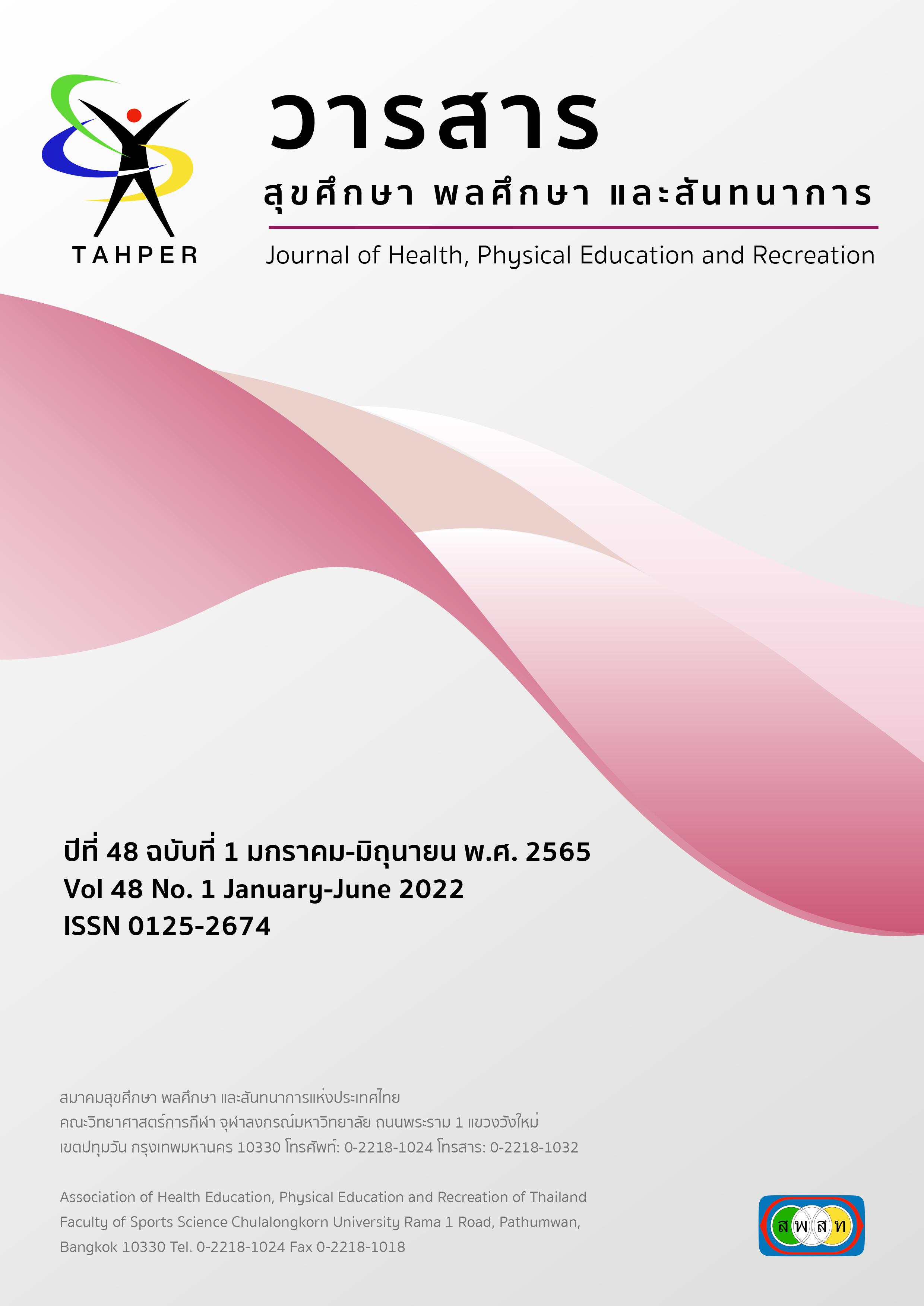ผลของการฝึกลูกบอลปฏิกิริยาที่มีต่อเวลาปฏิกิริยาตอบสนองการรับลูกแบบเคลื่อนที่ของนักกีฬาฮอกกี้ มหาวิทยาลัยเกษตรศาสตร์ Effect of Reaction Ball Training on Receiving Ball Dynamic Fielding Response Time of Hockey Players Kasetsart University
Main Article Content
Abstract
บทคัดย่อ
การวิจัยครั้งนี้มีวัตถุประสงค์ เพื่อศึกษาและเปรียบเทียบผลของการฝึกลูกบอลปฏิกิริยาที่มีต่อเวลาปฏิกิริยาตอบสนองการรับลูกแบบเคลื่อนที่ของนักกีฬาฮอกกี้ กลุ่มตัวอย่าง เป็นนักกีฬาฮอกกี้ชายของมหาวิทยาลัยเกษตรศาสตร์ จำนวน 20 คน มีอายุระหว่าง 19-28 ปี โดยสุ่มแบบเฉพาะเจาะจง แบ่งเป็น 2 กลุ่ม ๆ ละ 10 คน คือ กลุ่มควบคุมและกลุ่มทดลอง ทำการฝึก 8 สัปดาห์ ๆ ละ 3 วัน เครื่องมือการวิจัย คือ 1) โปรแกรมการฝึกทักษะกีฬาฮอกกี้และการฝึกรับลูกแบบเคลื่อนที่ 2) โปรแกรมฝึกลูกบอลปฏิกิริยา 3) แบบทดสอบปฏิกิริยาตอบสนองของร่างกายสำหรับนักกีฬาฮอกกี้ หาคุณภาพเครื่องมือจากผู้เชี่ยวชาญ จำนวน 5 ท่าน มีค่าความเที่ยงตรงเชิงเนื้อหา เท่ากับ .91, 1 และ .82 มีค่าความเชื่อถือได้ เท่ากับ .91 วิเคราะห์ข้อมูลด้วยโปรแกรมคอมพิวเตอร์ เพื่อหาค่าเฉลี่ย ค่าส่วนเบี่ยงเบน และความแปรปรวนสองทางชนิดวัดซ้ำ (two-way analysis of variance with repeated measure) ค่าที (t-test dependent) ก่อนการฝึก และหลังการฝึกสัปดาห์ที่ 8 และค่าที (t-test independent) หลังการฝึกสัปดาห์ที่ 8 ของทั้งสองกลุ่ม
ผลการวิจัยพบว่า 1) เวลาปฏิกิริยาตอบสนองการรับลูกแบบเคลื่อนที่ของกลุ่มควบคุมก่อนการฝึก และหลังการฝึกสัปดาห์ที่ 8 และกลุ่มควบคุมและกลุ่มทดลองหลังการฝึกสัปดาห์ที่ 8 ไม่แตกต่างกัน ส่วนกลุ่มทดลองก่อนการฝึก และหลังการฝึกสัปดาห์ที่ 8 ลดลงอย่างมีนัยสำคัญทางสถิติที่ระดับ .05 2) เวลาปฏิกิริยาตอบสนองระหว่างกลุ่มควบคุมและกลุ่มทดลอง ก่อนการฝึก หลังการฝึกสัปดาห์ที่ 4 และ 8 ไม่แตกต่างกัน และทดสอบกลุ่มควบคุมก่อนการฝึก หลังการฝึกสัปดาห์ที่ 4 และ 8 ลดลงอย่างมีนัยสำคัญทางสถิติที่ระดับ .05 ส่วนหลังการฝึกสัปดาห์ที่ 4 และ 8 ไม่แตกต่างกัน ส่วนกลุ่มทดลองก่อนการฝึก หลังการฝึกสัปดาห์ที่ 4 และ 8 เช่นเดียวกับหลังการฝึกสัปดาห์ที่ 4 และ 8 ลดลงอย่างมีนัยสำคัญทางสถิติที่ระดับ .05
คำสำคัญ : เวลาปฏิกิริยา เวลาปฏิกิริยาตอบสนอง ลูกบอลปฏิกิริยา
Abstract
This research was to study and compare the effect of reaction ball training on receiving ball dynamic fielding response time of hockey players. The samples were 20 male hockey players at age 19-28 by purposive sampling and randomly assigned into the experimental (n=10) and control (n=10) groups. The experimental 8 weeks, training 3 days per week. The research tools were: 1)Program hockey skill and dynamic fielding training 2) Program reaction ball training 3) Response time test. The tools were assessed by 5 experts, content validity was at .91, 1, and .82, and reliability was at .91. Analyzing data by using computer to find out mean, deviation, two-way analysis of variance with repeated measure and t-test difference of experimental group before and after training on week 8.
The research results were: 1) Response time dynamic fielding test of control group before and after training on week 8, and control group and experimental group after training 8 has no difference, while, the experimental group before and after training on week 8 reduced at .05 levels significantly. 2) Response time test between control group and experimental group before and after training on week 4 and 8 has no difference. The control group between before and after training week 4 and 8 reduced at .05 levels significantly, while, after training on week 4 and 8 has no difference. However, the experimental group before and after training and also the after training on week 4 and 8 reduced at .05 levels significantly.
Keywords: Reaction time, Response time, Reaction ball
Article Details
Critical thinking in journals is the right of the author. The Association of Health Education, Physical Education and Recreation of Thailand is not always required, to create diversity in ideas and creativity.
ความคิด ข้อวิพากษ์ในวารสารเป้นสิทธิของผู้เขียน สมาคมสุขศึกษา พลศึกษา และสันทนาการแห่งประเทศไทยไม่จำเป็นต้องเห็นชอบด้วยเสมอไป เพื่อให้เกิดความหลากหลายในความคิดและความสร้างสรรค์


